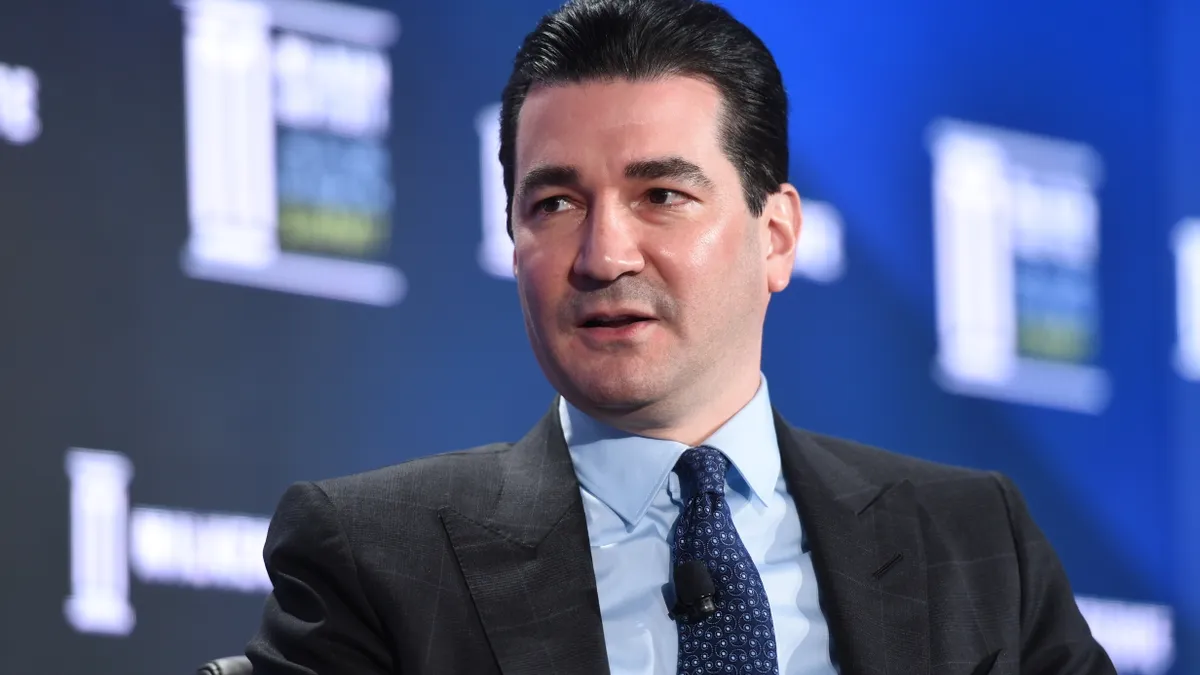Dive Brief:
-
Scott Gottlieb, the commissioner of the Food and Drug Administration, unexpectedly resigned Tuesday, the Washington Post first reported. In a note posted to the FDA's Twitter account Tuesday evening, Gottlieb said the only thing that could pull him away from his role is the challenge of being away from his family.
-
The regulator, who took office May 11, 2017, has been a steady figure at the agency throughout President Donald Trump’s tenure. He has supported food safety and labeling initiatives already in place. He also has pushed forward with regulatory issues dealing with standards of identity, food technology and CBD.
-
According to the Post, he will remain in his position for about a month. Officials told the newspaper that Gottlieb wanted to spend more time with his family, and the White House had not sought his resignation. No replacement has been named.
Dive Insight:
When Gottlieb’s surprise regulation was announced, media outlets started writing stories that addressed the things he’d championed and brought forward in his tenure. Perhaps not surprisingly, almost none of them made any mention of his work in the food sector, focusing instead on drug prices, vaping and opioids. It drives home just how much the FDA oversees — though it glosses over how active Gottlieb was in food regulations and safety.
While many officials in the Trump administration have focused on reducing regulations and undoing initiatives started under President Obama, Gottlieb seemed to be an exception. He stated many times he planned to not only stay the course charted for food regulations, terminology, labeling and safety, but would be moving forward with initiatives that seemed stalled. He also responded quickly to developments in food science and federal law, putting a priority on helping manufacturers figure out complex issues, both in front of them and on the horizon.
Gottlieb’s resignation caught many in the industry off guard. In a statement from the Grocery Manufacturers Association, the trade group said Gottlieb’s FDA was “a strong and effective champion of public health.”
“His candor, transparency and willingness to work together was a welcomed approach in the regulatory environment,” GMA said. “The consumer packaged goods industry believes in smart, uniform regulation and a strong FDA is a critical partner in building trust in the products Americans use every day."
The largest looming regulatory question mark is what to do with CBD, a derivative from hemp, which was taken off of the list of Schedule I controlled substances with the signing of the Farm Bill in December. CBD is a non-psychoactive compound, considered an anti-inflammatory substance that helps with relaxation and pain relief. Food and beverage manufacturers have been clamoring for the opportunity to sell products with CBD added as a functional ingredient.
While it is now legal to grow hemp anywhere, Gottlieb said the federal government needs to determine regulatory pathways in order to get CBD products to market. In a U.S. House subcommittee hearing last week, Gottlieb said he understands the need to make CBD available to consumers.
“For CBD to be legally marketed as an ingredient in a food or dietary supplement, the law requires that the FDA first would need to issue a regulation to permit such marketing,” he told lawmakers. “We’re planning to seek broad public input on this pathway, including information on the science and safety behind CBD.”
Gottlieb said he planned to move forward with a hearing on regulating the substance sometime in April. No hearing date has been set, and it remains to be seen if it will take place next month.
Another contentious issue Gottlieb had gotten involved in was determining a regulated definition of milk. Dairy producers want the term restricted to products of animals — and not used to describe beverages made from plant-based items such as almonds, soybeans and oats. With traditional dairy in decline, terminology has become more important to producers struggling to maintain market share in the face of mounting competition.
The FDA was directed to take up the labeling issue last year in a $1.3-trillion omnibus spending bill. The agency was collecting public comments on the definition. While no decisions have been made, Gottlieb seemed to be leaning toward limiting the debated terms to dairy products, saying last year at an event sponsored by Politico that “an almond doesn’t lactate.”
Gottlieb also was working with the U.S. Department of Agriculture on regulating another new area in food: cell-cultured meat. Even though there are no lab-grown meat products in the market, the FDA has been working to get a head start on figuring out labeling and regulatory pathways. The agency held a summit to begin the discussion last summer.
While Gottlieb was praised for trying to get ahead of the curve, the agency also was criticized for beginning discussions without the USDA, which regulates animal-based meat. In November, the two regulators announced they will work together on a new framework. However, it’s unclear if regulating such a nascent industry will be a priority for Gottlieb’s successor.
Last spring, he told the National Food Policy Conference that several consumer education initiatives — including the new Nutrition Facts label, calorie counts on foodservice menus, regulated definitions of “healthy” and “natural,” and voluntary sodium reduction guidelines — were key to the agency achieving its goals.
“Consumers have long been interested in ways to identify healthful foods by looking at the label when shopping for groceries,” Gottlieb said.
Consumer groups worried the FDA’s last-minute delay of required menu calorie counts in 2017 was the death knell for the regulation, but it took effect last year. The deadline for the updated Nutrition Facts panel also was pushed back 18 months, but it is appearing on packages now and will be mandatory for most manufacturers next year.
Food safety also falls under the FDA’s umbrella. While Gottlieb delayed the date of compulsory water testing standards under the Food Safety Modernization Act’s Produce Safety Rule, he stepped up enforcement following several foodborne illness outbreaks involving romaine lettuce. The federal agency — and state departments it is working with — will be doing routine FSMA inspections of the largest domestic and international produce farms, Gottlieb announced last month.
Since this resignation was so unexpected, it’s unclear who Gottlieb’s successor will be. Before taking the top spot at FDA, Gottlieb — a physician and venture capitalist who worked with drug companies and crusaded against regulations — had little experience regulating the food industry. He took on the agency’s broad mantle and moved the food industry forward. With so many big changes ready to take effect, the food and beverage industry needs someone in that position who will give them the attention they need.














